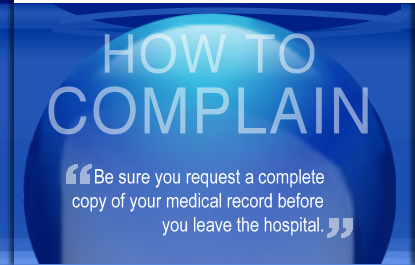|
|
 |
 |
| |
| 1. |
Be sure that you request a complete copy of your medical records before you leave the hospital. Patients are generally entitled to one free copy for personal records. Some hospitals now charge 25¢ per page. Read through your records for accuracy. |
| |
|
| 2. |
To file a complaint with the Medical Board, go to your State Medical Board’s website and print out the Medical Complaint form, read the instructions and complete it. |
| |
|
| 3. |
Make copies of your complaint along with your photos, before and after surgery and any other documentation you feel is necessary to make your case. |
| |
|
| 4. |
Hand deliver or send a return receipt to the Medical Board office. If you hand deliver your complaint form, make sure you have two copies, one for them to keep date stamped and one for your records date stamped as your proof of delivery. |
| |
|
| 5. |
Consult with a Medical Malpractice Attorney to see if you have a case. Bring your records, documentation and photos. |
| |
|
| 6. |
Follow up with a call to the Medical
Board within 30 days to see if your case has been assigned
to an Investigator. Follow up periodically with the
Investigator to see if they need anything further from you
and what the status of your case is. |
| |
|
| 7. |
Be patient. They are short staffed and they receive hundreds of complaints. |
| |
|
|
| |
| |
|
**Caveat** |
|
Medical Board review committees are made up of doctors who tend to give colleagues a fair amount of latitude in evaluation of their actions. Especially in cases where the doctor in question states the procedure done was an ‘emergency.’
Medical Boards also require a complainant’s burden of proof to meet a higher standard of medical/scientific proof than that of a regular court of law.
Medical Boards (and all agencies) include the actual medical records in their review process. The first rule of medical records charting is ‘If it’s not in the chart…it didn’t happen.’ Many times when an adverse event happens the details are not included in the actual patient charts, but are addressed in a confidential ‘incident report’.
I was surprised to read my medical records and find that there was absolutely no record of the black dot, which appeared on my stomach to signal the surfacing of my necrotizing fasciitis. No description of it’s growth in just an hour and a half, no mention of my mother being asked to assist the doctor in a deep abdominal surgical procedure at my bedside. It just ‘didn’t happen’.
If you feel that your records do not accurately reflect what was done in your case, you must mention that up front and include any support for your allegations (ie. Contradictory photos, notarized witness statements, etc.)
Cases can be difficult but not impossible to prove. |
|
|
| |
| |
| |
| |
| |
|




